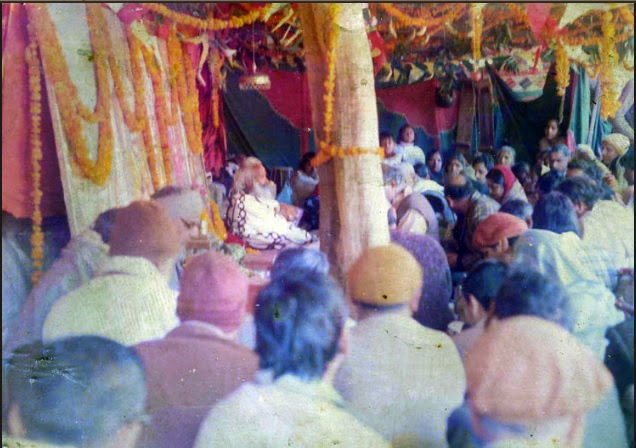- At Babaji’s ashram the straw for feeding the cows (gausewa) used to be kept on top of the dharmshala and inevitably some straw and even insects used to fall down into the dharmshala from the gaps between the sleepers which formed the dharmshala roof.
One day Geli Mai, an elderly sadhvi disciple of Babaji’s came slowly into the dharmashala leaning on a long sturdy staff. With difficulty she knelt down and bowed to Babaji and sat down close to him putting the staff on the ground between them. After a few minutes a caterpillar-like insect crawled up onto her white sari. Pulling a face signifying her disgust for the creature, she picked up a long straw and placing one end under the insect she flicked it away from her. Babaji immediately picked up her staff and, wrinkling his face up to mimic her look of disgust, placed the end of the staff under her knee and pretended to flick her away from him.
Everyone in the dharmshala burst into laughter at Babaji’s play but the deep lesson of equality of all beings was not lost to some of us. For me the sober lesson stayed with me all my life as did each of his teachings that he gave with every word and action that he graced us with.
Nani Mai
Reflection by Kanshi Ram
When we used to pay visits to Babaji, the place was almost infested with scorpions. Some of those who lived there were once or several times stung by the scorpions. But it was strictly prohibited by Babaji to cause any harm to the scorpions there. This means that Babaji saw every living being as not different from him. Moreover, this is the characteristic of a saint that he is devoted to the welfare of each and every living being as is clear from the quotation from Shrimadbhagavagita,12.4 ‘sarvabhutahite rataa.h’ and from the reminiscence given above by Naniji, Babaji’s great devotee. This is also amply clear from the life of Sri Ramana Maharshi as he treated every living being equally whether it is a cow or a monkey or a dog or a squirrel.

